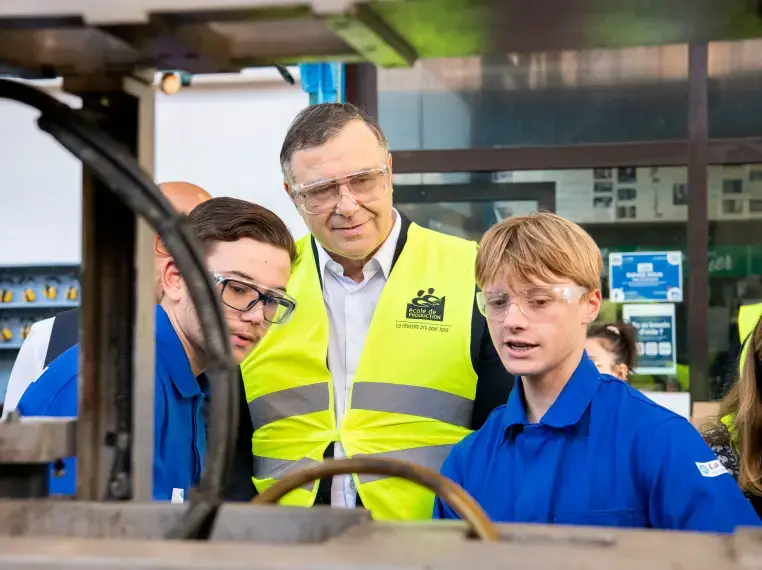
The Écoles de Production: accessing jobs in high demand through hands on training: #LearningByDoing
From locksmithing and metal working to boiler making or machining, the Écoles de Production offer young people aged 15 to 18 qualifying training courses based on a “learning by doing” approach: students acquire professional expertise by fulfilling actual client orders. This unique approach relies on multiple players working in close collaboration with the common goal of addressing social and economic educational challenges of the various territories. On January 01, 2024, the Écoles de Production national network comprised 67 institutions and another five are due to open by the end of 2024.
As early as 2018, TotalEnergies Foundation has committed itself to supporting the development of this network to the best of its ability. The goal is now to multiply fourfold the number of schools until reaching 100 facilities with an enrollment capacity of 4,000 students each, in 13 regions by 2028.

The Écoles de Production: an other way to learn a profession
The Écoles de Production are certified, private, non-profit establishments offering a tangible solution to the challenges of unemployment faced by young people. Students acquire practical knowledge, an expertise that is well sought-after by employers. They rely on a human-scale educational model, with classes of 10 to 12 students under the supervision of a vocational teacher, thereby guaranteeing personalized guidance and training. Furthermore, by welcoming 15 year-old students, the Écoles de Production offer a new solution to school drop-out.
schools for training in industrial professions, created by December 31 and supported by TotalEnergies Foundation.
Training courses accessible to everyone
The Écoles de Production receive young people based solely on how motivated they are, not on their school reports. The diversity of the student population fosters open-mindedness, mentoring and encourages students to surpass themselves. Students with learning difficulties or in highly vulnerable social situations find themselves in a well-meaning and stimulating environment with their peers and professional instructors.
The results speak for themselves: in June 2024, 88% of students obtained their CAP, and 95% their professional Baccalaureate. On top of that, 93% of young people trained in the Écoles de Production continue their studies or find a job.

The Écoles de Production are well on the way to achieving their goal
A rapidly expanding network
Since 2018, the Écoles de production have been growing in popularity and developing - the network has expanded from 25 to 71 schools. The extension of the network has helped cover five new regions and 22 new departments to offer local training to over 2,000 young people. The trend continues with about a dozen projects in the pipeline for 2025.
TotalEnergies Foundation supports the creation of new schools devoted to industrial professions, by contributing to the funding for feasibility studies, purchasing equipment and front-end fees, until the schools find their economic balance. It also contributes to a solidarity fund to help students with their daily difficulties (transport, accommodation, food), which has already benefited over 710 young people.
By 31 December, 2024, this support has contributed to the creation of 41 schools and the extension of 10 existing schools.

A successful partnership for young people, territories and businesses
The process of creating an École de Production is part of a territorial project and relies on the need for academic, organizational, administrative (municipalities, regions and State) and economic players to work closely together. More than 2,000 companies, including small and medium-size businesses, have signed partnerships with Écoles de Production.
TotalEnergies Foundation has decided to provide the Fédération Nationale des École de Production with substantial support. Not only is this endeavor in line with our values and expertise, but it also constitutes a tangible and inspiring complementary approach to foster the professional inclusion of young people and a response to businesses’ needs, thus contributing to the vitality of the territories across France.
Key figures
The Écoles de Production network on December 31, 2024:
71 schools in 12 regions and 40 departments in France, to provide training for over 2,000 young people.
Since March 2018, TotalEnergies Foundation has supported the creation of 41 schools and the extension of 10 existing schools.
In June 2024:
- 88% success rate for the CAP (HNVQ equivalent) and 95% for the professional baccalaureate.
- 93% positive outcomes (further studies or employment)
Since their creation, the Écoles de Production have trained more than 12,000 students.
TotalEnergies Foundation: providing support at every step of the way
Aside from financial support, TotalEnergies Foundation contributes to upscaling the Fédération Nationale des Écoles de Production through an array of tools focused on skills required in various fields (communication, management, digital strategy).
TotalEnergies Foundation encourages the development of alliances with other funders or organizational partners so as to boost consistency and impact. The Company’s teams in the national territories aim to foster the creation of new schools by helping to promote the Écoles de Production’s educational model, share their field experience, but also by putting local players in contact with each other and helping them expand their networks in territories where TotalEnergies’ facilities are located. Placed at the heart of TotalEnergies Foundation’s approach, this partnership-based logic happens to be crucial for guaranteeing the success and durability of the Écoles de Production project.
Finally, since openness and soft skills are conducive to a fulfilling experience for young people, interventions focusing on road safety - one of our top priorities - were organized in 24 schools. By allocating 100% of the funds received as a sponsor to young beneficiaries, TotalEnergies Foundation also encourages students in the Écoles de Production students to partake in artistic projects, attend exhibitions or performances. These new opportunities can help them broaden their cultural horizons and promote professional inclusion.